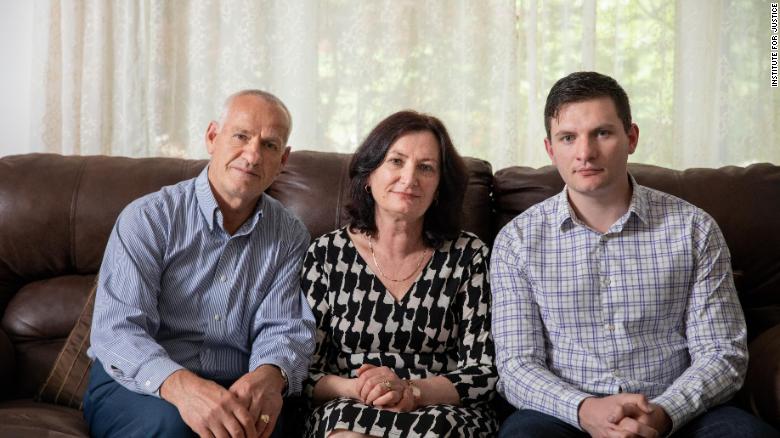US Customs seizes Ohio family's life savings at airport

Rustem Kazazi, left, his wife, Lejla, and son Erald have sued US Customs and Border Protection.
(CNN)Members of an immigrant family in Ohio say US Customs and Border Protection seized $58,100 of their life savings. Now they want it back.
Rustem Kazazi, 64, was headed to his native Albania to visit relatives in October, according to a federal lawsuit that he, his wife, Lejla, and son, Erald, filed this week in Ohio against the agency and others.
The suit alleges Customs and Border Protection used civil forfeiture laws to take the money without arresting or charging anyone with a crime.
Kazazi had planned to spend six months in Albania and buy a vacation home for retirement on the Adriatic coast, according to court documents. He also wanted to help members of his extended family, who are struggling, the court documents said.
To make the transactions easier and avoid bank fees, he reduced his family's life savings to cash, packed it in a carry-on and brought it with him to the airport, according to the family's lawsuit.
"He counted the cash several times, separated it into three stacks of $20,000, $19,100 and $19,000 each, and then, after counting again, labeled each stack with the amount it contained. He then placed the three stacks in a single envelope and wrote '$58,100' on the outside," the documents state.
Transportation Security Administration agents spotted the money inside Kazazi's bag as he went through security on October 27 at Cleveland's airport to catch a flight to Newark, New Jersey, before flying out to Albania, according to court documents. TSA called Customs and Border Protection agents, who took Kazazi's passport and driver's license, according to the filing.
He was put in a small private room for a body search, the documents state.
Kazazi speaks limited English, according to the lawsuit.
Customs agents "interrogated him without a translator, and then seized his family's life savings without charging anyone with a crime," according to the Institute for Justice, whose attorney, Wesley Hottot, is representing the Kazazi family in the lawsuit.
Later, the agents gave Kazazi a receipt for an unspecified amount of "US Currency," the court filing said.
Customs and Border Protection has declined to comment on the case, citing pending litigation.
The suit said that Kazazi was in shock after this encounter and called his wife, who convinced him to continue his trip to Albania with only the money he had in his wallet.
In December, Customs and Border Protection sent Kazazi a notice saying agents had seized the cash because it was "involved in a smuggling/drug trafficking/money laundering operation," according to the lawsuit. The agency also said $57,330 was seized, or $770 less than Kazazi was carrying, the suit said.
The family said the allegations are baseless, and by holding the money, the agency is breaking the law.
"Because the Kazazis did nothing wrong, the government had to make something up. That is why, more than a month after the seizure, CBP tried to justify its actions," the Institute for Justice said in a statement.
"None of this is true -- the Kazazis saved up their money from jobs they held lawfully in America, and they have 13 years of tax documents and bank statements to prove it. Moreover, the government has never pointed to any evidence of wrongdoing."
The Civil Asset Forfeiture Reform Act of 2000, the lawsuit says, "requires the government to return seized property, initiate civil forfeiture proceedings or initiate criminal proceedings within 90 days of the date on which the seizing agency received the property owner's demand for federal court proceedings."
That deadline, it says, was April 17.
On its website, Customs and Border Protection says there's no limit on the amount of money one can take out of the country or bring in, but travelers must declare any amount over $10,000.
"If a person or persons traveling together ... have more than $10,000 in currency or negotiable monetary instruments, they must fill out a report of international transportation of currency and monetary instruments," the site says.
It's unclear whether one has to declare the money at the first stop at an airport or before leaving the United States.
Kazazi, who had a layover in Newark, was aware of the filing requirement and planned to do so there, according to Johanna Talcott, another attorney for the Institute for Justice.
"If they are concerned that he was not complying with the reporting compliance, they did not note it on the paperwork at the time of the seizure," Talcott said.
"What they are doing now is Monday morning quarterbacking. They're getting a little bit of heat, getting a little bit of attention, and are trying to make him look bad."
Wanting a better life for his children after the fall of communism, Kazazi and his family moved to the United States from Albania after receiving visas through the State Department's lottery program in 2005, according to the lawsuit. The Kazazis settled in the Cleveland area, becoming US citizens five years later, the suit said.
CNN's Deanna Hackney and Chris Boyette contributed to this report.




No comments:
Post a Comment